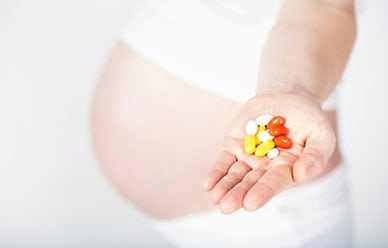There are an estimated 23,000 miscarriages every year in the United States. About 3 percent of babies born in the U.S. have some type of birth defect, and these congenital defects are responsible for about 20 percent of all newborn fatalities. It is common knowledge that many different vitamins are crucial for a healthy pregnancy. Now, a new study claims to have made a groundbreaking discovery by identifying vitamin B3 deficiency as a major cause of both miscarriages and birth defects. Getting enough vitamin B3 during pregnancy may help prevent many congenital birth defects and miscarriages among pregnant women, according to researchers.
What is Vitamin B3?
Also known as niacin, vitamin B3 is essential for healthy cholesterol levels and cardiovascular health. It’s also necessary for the production of NAD, a molecule identified in a new study as crucial for metabolic regulation, energy production, DNA repair and organ development.
Several studies have found that niacin is effective at reducing triglycerides and boosting HDL (good) cholesterol levels, and it has a modest effect on lowering LDL (bad) cholesterol. Many people prescribed drugs to control cholesterol, such as Crestor, are also prescribed vitamin B3 supplements. Research has found that niacin can only help control cholesterol when prescribed at high doses, which comes with risks such as liver damage and glucose intolerance. Niacin may also help reduce hardening of the arteries, or atherosclerosis, and it may be recommended for people who have already had a heart attack.
The Link Between Vitamin B3 and Birth Defects
Professor Sally Dunwoodie of the Victor Chang Cardiac Research Institute in Australia and her team of researchers pioneered a new study that identified an important factor responsible for many miscarriages and congenital defects of the cleft palate, kidneys, heart and spine. The study, published in The New England Journal of Medicine, is an important breakthrough in pregnancy research as it found that vitamin B3 may cure the molecular deficiencies behind these birth defects and miscarriages.
Researchers discovered that a deficiency in NAD, an important molecule, can prevent a baby’s organs from developing properly in utero. NAD is an essential molecule that is important for cell communication, energy production and DNA repair. Both genetic and environmental factors can disrupt the body’s production of NAD.
 The study began by focusing on families with a condition called VACTERL in which people are born with three or more rare congenital defects. The researchers found that NAD deficiency negatively affected the formation of embryos in people exhibiting VACTERL, causing birth defects or miscarriage, but 12 years of research found that NAD deficiency may also be to blame for other cases of congenital defects and miscarriage.
The study began by focusing on families with a condition called VACTERL in which people are born with three or more rare congenital defects. The researchers found that NAD deficiency negatively affected the formation of embryos in people exhibiting VACTERL, causing birth defects or miscarriage, but 12 years of research found that NAD deficiency may also be to blame for other cases of congenital defects and miscarriage.
The team discovered that NAD deficiency has a simple cure: Vitamin B3, or niacin, which is used by the body to synthesize NAD. During the study, the researchers found that increasing levels of niacin during pregnancy was able to prevent both birth defects and miscarriages. By introducing high enough levels of vitamin B3 into the diets of pregnant women, miscarriages no longer happened and the babies were born healthy.
A separate study published in the Journal of the American College of Nutrition found that at least one-third of pregnant women are low in vitamin B3 during their first trimester, a crucial time for organ development. This study found that vitamin B3 levels were low in about 60 percent of women by the third trimester, despite taking prenatal supplements.
Vitamin B3 for a Healthy Pregnancy
The researchers who discovered the link between vitamin B3 and birth defects believe that the use of B3 complex supplements can be effective at preventing miscarriages and common congenital defects like spina bifida and some kidney and heart defects. Because the earlier separate study found that many pregnant women have a B3 deficiency in their first trimester despite taking prenatal supplements, the scientists believe that an even higher amount of vitamin B3 may be necessary for women than what is available with current supplements.
The researchers say that pregnant women should only take B3 supplements on the recommendations of their physicians as they don’t know which doses are necessary to prevent these complications in every case. Soon, however, they will begin developing a test to measure NAD levels in pregnant women to identify women at risk of miscarriage or birth defects.
The American Pregnancy Association recommends 18 mg of niacin per day for pregnant women, a slightly higher daily dose than 14 mg recommended for all women. Pregnant women can also supplement their diet with foods rich in niacin. This includes:
- chicken breast: 9 mg per 3 ounces
- turkey: 101 mg per breast
- peanuts: 22 mg per 1 cup
- tuna: 11 mg per 3 ounces
- green peas: 3 mg per 1 cup
- mushrooms: 7.5 mg per 1 cup
- lean pork chop: 9 mg per 3 ounces
- lean beef: 7.5 mg per 3 ounces
While most women can get their daily suggested intake of vitamin B3 from diet alone, this new study suggests that these recommendations should be revisited, especially for women who are at high risk of miscarriage and those found to have low vitamin B3 during pregnancy or while trying to become pregnant.
 It is well known that it is important to get a wide range of vitamins as part of
It is well known that it is important to get a wide range of vitamins as part of  Although vitamin D is one of the most important nutrients for human health, many modern people are deficient. This vitamin is produced mainly through a reaction found in skin cells when they are exposed to ultraviolet light. Many people in the modern world wear sunscreen to lower their skin cancer risk,
Although vitamin D is one of the most important nutrients for human health, many modern people are deficient. This vitamin is produced mainly through a reaction found in skin cells when they are exposed to ultraviolet light. Many people in the modern world wear sunscreen to lower their skin cancer risk,  According to new research, a vitamin B12 deficiency during pregnancy may have more effects than previously realized. Even babies who are born appearing to be in good health may suffer the consequences over their lifetimes. In one study, vitamin B12 levels were measured in pregnant women and both their and their babies’ health was analyzed. Babies born to mothers with a B12 deficiency had
According to new research, a vitamin B12 deficiency during pregnancy may have more effects than previously realized. Even babies who are born appearing to be in good health may suffer the consequences over their lifetimes. In one study, vitamin B12 levels were measured in pregnant women and both their and their babies’ health was analyzed. Babies born to mothers with a B12 deficiency had  Folic acid is arguably the
Folic acid is arguably the  When you’re pregnant, your body must make a great deal more blood. Because it is hard to get all of the iron you need to support this increased blood volume from diet alone,
When you’re pregnant, your body must make a great deal more blood. Because it is hard to get all of the iron you need to support this increased blood volume from diet alone, 